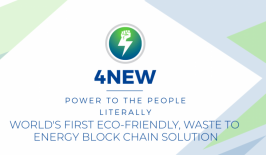Thirty per cent of developmental aid is thought to go missing due to corruption and fraud. Aid:Tech hopes blockchain can create a direct, incorruptible, relationship between donor and beneficiary.
An estimated 140 billion USD of developmental and foreign aid was provided by donors and nation states in 2016. With such a huge figure being distributed around the globe, it’s almost inevitable that funds will go missing, either due to poor management or malicious theft. Furthermore, the fact that these funds are often managed by only a few – less than transparent – organisations means it’s incredibly difficult for outside observers to accurately know which funds have arrived at their intended destination, and which have not.
Now, a Dublin-based financial tech company, Aid:Tech, wants to harness the power of blockchain to help clean up and streamline the transferring of all kinds of different resources from one place to another – from aid and donations to remittances and social welfare.
Collaborating with both NGOs and corporations, Aid:Tech provides their end-users with a digital identity – a sort of “financial fingerprint” – through which they are able to receive funds or goods, in a digitised version. This allows aid organisations to send people digital assets (that represent real world goods: food, clothing etc) to anyone in the community, anywhere in the world, almost instantly – a bit like topping up phone credit for somebody else on their behalf.
Thanks to blockchain technology, every activity is permanently recorded and trackable – from allocation to delivery to the end recipient. This ensures the funds allocated to each individual are received and means the providers of the resources can see exactly when and where they ended up. The decentralised nature of the blockchain means misallocation of funds, either through mismanagement or corruption, is much harder to carry out.
The Project In Practice: Lebanon
Aid:Tech first trialled their system in 2015 with 100 Syrian refugee families housed in Lebanese camps. Working alongside the Irish Red Cross, Aid:Tech distributed identities in the form of 500 cards (otherwise known as “intelligent vouchers”) that each contained a unique QR code linked to an associated blockchain wallet address. The QR code acted as an identifier for the card, and was linked both with the individual’s digital identity and their digital assets. Each card was loaded with 20 USD of donated funds which could be redeemed for goods in the participating stores. The cashier simply had to scan the QR code, check the individual’s identity on the terminal, confirm what exactly they were entitled to, and then complete the transaction. Donors received a notification of when and how the assets had been retrieved, with the Irish Red Cross also monitoring the transactions.
The trial proved a huge success, with all 500 vouchers redeemed for goods. All intentional attempts to create fraudulent vouchers failed at the point of the sale. It was the first time in history that blockchain technology had been used to distribute aid to refugees.
The Next Step
Aid:Tech is now looking to roll out the system further with their own platform. Importantly, they hope to partner with trustworthy institutions which already have the ability to administer and verify their end users. The digital identity component of Aid:Tech can then be added to pre-existing identification cards and passports – reducing the complexity of the system.
The system is not just limited to distributing aid either. Aid:Tech’s services also be used for domestic welfare distribution, international remittances and healthcare, with Aid:Tech trialling the latter with pregnant women in Tanzania in an initiative called the Chain of Trust (CoT) project. This led to the so-called “first baby born on the blockchain.” With CoT, Aid:Tech’s blockchain tools were used to digitally monitor women’s pregnancies, record crucial development milestones, send them alerts about check-ups and generally support and regulate their access to healthcare provisions.
Aid:Tech is set to launch TraceDonate, a blockchain donation app with complete end-to-end transparency in 2018.
This article was edited by Marisa Pettit in November 2018.







